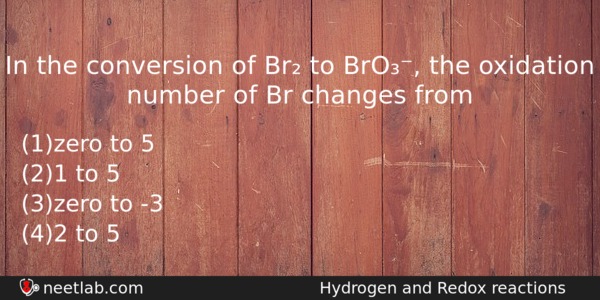| ⇦ | 
| ⇨ |
In the conversion of Br₂ to BrO₃⁻, the oxidation number of Br changes from
Options
(a) zero to 5
(b) 1 to 5
(c) zero to -3
(d) 2 to 5
Correct Answer:
zero to 5
Explanation:
Br → BrO₃⁻
Any free (unattached)element with no charge has the oxidation state of zero.
Let the Oxidation number of Br in BrO₃⁻ be x.
Hence x + 3(-2) = -1, x – 6 = -1, x -6 + 5 = -1, x = +5.
Related Questions: - A dibromo derivative of an alkane reacts with sodium metal to form an alicyclic
- Bleaching powder is prepared from the reaction of
- The combustion enthalpies of carbon , hydrogen and methane are -395.5 kJ mol⁻¹
- In the complex with formula MCl₃.4H₂O, the coordination number of the metal M
- Orthonitrophenol is steam volatile while para-isomer is not. This is because of
Topics: Hydrogen and Redox Reactions
(174)
Subject: Chemistry
(2512)
Important MCQs Based on Medical Entrance Examinations To Improve Your NEET Score
- A dibromo derivative of an alkane reacts with sodium metal to form an alicyclic
- Bleaching powder is prepared from the reaction of
- The combustion enthalpies of carbon , hydrogen and methane are -395.5 kJ mol⁻¹
- In the complex with formula MCl₃.4H₂O, the coordination number of the metal M
- Orthonitrophenol is steam volatile while para-isomer is not. This is because of
Topics: Hydrogen and Redox Reactions (174)
Subject: Chemistry (2512)
Important MCQs Based on Medical Entrance Examinations To Improve Your NEET Score
18000+ students are using NEETLab to improve their score. What about you?
Solve Previous Year MCQs, Mock Tests, Topicwise Practice Tests, Identify Weak Topics, Formula Flash cards and much more is available in NEETLab Android App to improve your NEET score.
Share this page with your friends

Leave a Reply